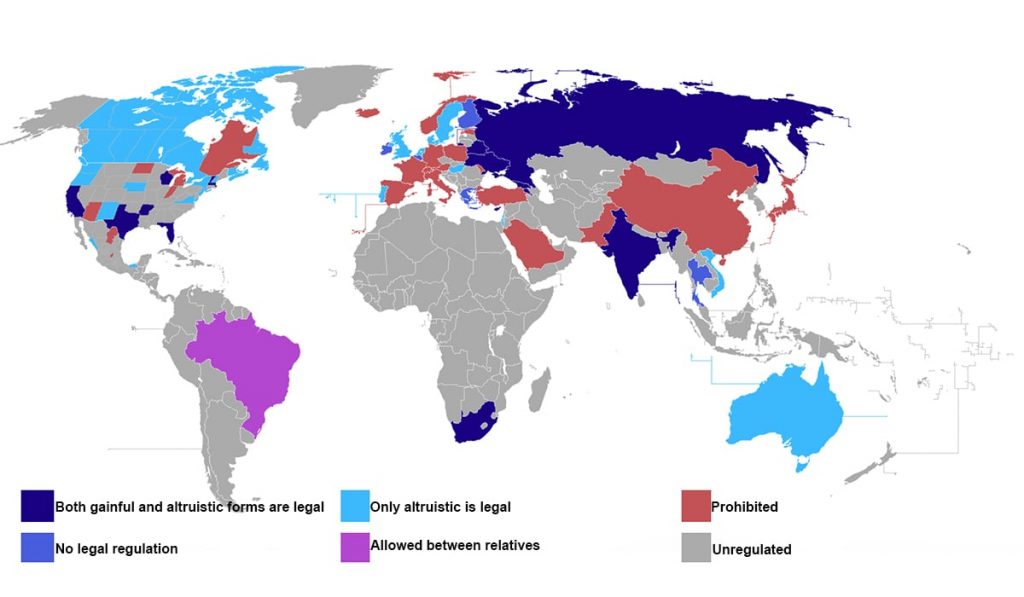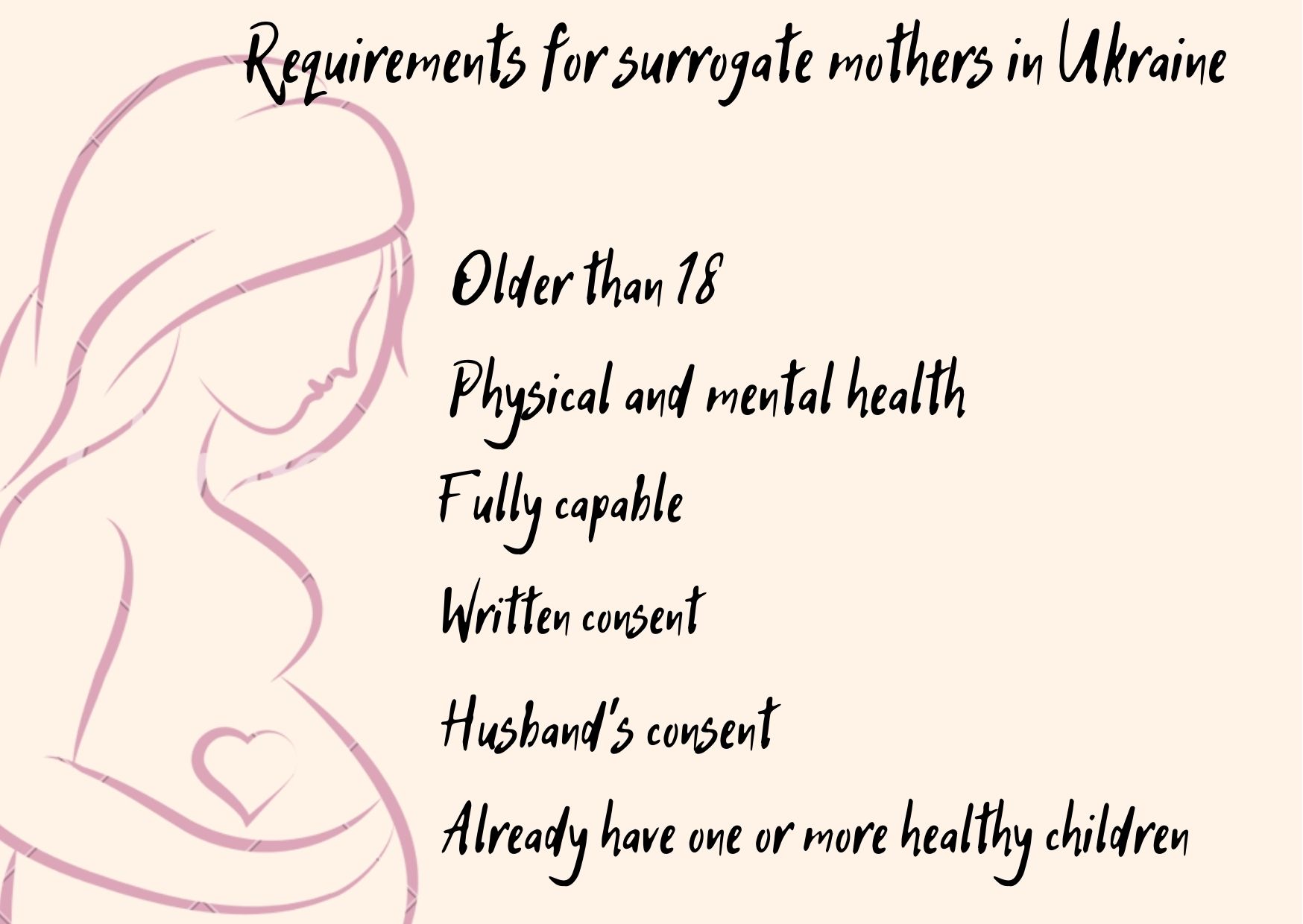Why do foreigners choose Ukraine for surrogacy programmes?
In recent years, Ukrainian surrogate mothers have given birth to more than 6,000 children for foreigners.
The main argument in favour of Ukraine is
- the legality of the surrogacy procedure at the state level
- low prices compared to other countries
Ukrainian legislation clearly regulates the surrogacy process, guarantees the safety and predictability of the programme for intended parents and surrogate mother.
Intended parents are protected by law and are considered the legal parents of the child from the moment of conception.
As soon as the child is born, the parents receive a birth certificate, where they will be listed as mother and father. The birth certificate does not contain any information about the surrogate mother.
Spouses who have used surrogacy services in Ukraine do not need to go through any court proceedings for adoption or recognition of their parental rights in relation to the child born.
A surrogate mother in Ukraine does not have parental rights in relation to a child born to a genetically alien mother. Thus, a surrogate mother cannot refuse to hand over the child to its biological parents.
In addition to clear and precise legislation in the field of surrogacy, Ukraine also stands out among other countries for the low prices of surrogacy programmes.
On average, the price of surrogacy in Ukraine ranges from 35,000 to 58,000 euros. For comparison, in the Czech Republic, for example, the price of surrogacy ranges from 65,000 to 85,000 euros.
The price of surrogacy varies depending on the type of programme you choose:
- Surrogacy with the creation of embryos from the woman's own oocytes (eggs) and her husband's sperm
- Surrogacy with donor eggs or sperm
- Surrogacy with own already created and frozen FET embryos

What can be done to make the surrogacy programme comfortable and safe?
Surrogacy involves complex coordination, planning and legal contracts.
The right choice of an agency with a high level of experience in the field of surrogacy ensures that future parents have a positive and successful outcome of the surrogacy programme. From the moment of signing the contract, the agency's employees are in constant communication with the future parents.
UaMedTours is an expert in the field of surrogacy in Ukraine, so you do not have to worry about organisational and legal issues.
Take the first step towards your dream - leave a request for a free consultation.
Surrogacy in Ukraine: Law, legality
Ukraine is the most liberal country in terms of surrogacy. Surrogacy in Ukraine is legal, including commercial surrogacy, and is regulated by the following legislative acts: The Civil Code of Ukraine, the Law of Ukraine "Fundamentals of the Legislation of Ukraine on Healthcare", the Family Code of Ukraine, Order of the Ministry of Health of Ukraine No. 787 dated 09.09.2013 "Procedure for the Use of Assisted Reproductive Technologies in Ukraine".
Main provisions of legislative acts in this area:
- P.2 Art.123 of the Family Code of Ukraine: "In the case of transfer of a human embryo conceived by a married couple as a result of the use of assisted reproductive technologies into the body of another woman, the parents of the child are the spouses".
- Article 281, Paragraph 7 of the Civil Code of Ukraine: "An adult woman or man has the right, on medical grounds, to assisted reproductive technology programmes.
- Order of the Cabinet of Ministers of Ukraine No. 787 "On Approval of the Procedure for the Application of Assisted Reproductive Technologies in Ukraine" of 09.09.2013.
Order No. 787 specifies the conditions for using surrogacy:
availability of medical indications for the perso
Resolution No. 787 sets out the conditions for the use of surrogacy:
- the spouses in whose interests the procedure is carried out must have medical indications
- the spouses (or at least one of the parents) must have a genetic relationship with the child
- the surrogate mother must not have a genetic relationship with the child. Only gestational surrogacy is permitted in Ukraine
Surrogacy legal aspects in Ukraine
Ukraine is de facto a country of so-called "commercial surrogacy". The legal framework contains a minimum of restrictions for the procedure, both for Ukrainian citizens and foreigners.
Cases of refusals in the surrogacy programme:
- The absence of medical indications for the surrogacy programme, i.e. the ability to become pregnant, carry a fetus and give birth on their own.
- The presence of a genetic link between the surrogate mother and the embryo being carried (surrogacy using a surrogate mother's egg)
- Participation in the programme by unmarried couples, single people
- Participation in the programme as a surrogate mother, a woman who does not meet certain medical requirements (age, health status, presence of her own child)

Do I need notarial documents for surrogacy?
Clause 6.11 of Resolution No. 787 contains a list of documents required for the procedure. This list includes a "notarised written agreement between the surrogate mother and the couple".
Such an agreement is the main regulatory act on the basis of which surrogacy is carried out, while other documents from the agreement package are of auxiliary importance. A properly drafted agreement is a guarantee of minimising legal risks for both the surrogate mother and the biological parents.
In addition to the notarised surrogacy agreement, the following documents are required:
- Application of the patient (spouse) for the use of assisted reproductive technologies, i.e. the application of the surrogacy procedure to them.
- Application of the surrogate mother for participation in the surrogacy programme.
- Notarised application (consent) of the surrogate mother to carry the embryo of the biological parents.
- Notarised consent of the surrogate mother's husband to his wife's participation in the surrogacy procedure
- A notarised surrogacy agreement (surrogacy agreement), as described earlier.
- A notarised application (consent) from the surrogate mother indicating the spouses (biological parents) as the child's parents.
- A certificate from an accredited medical institution confirming the use of assisted reproductive technologies and the child's genetic relationship with at least one of the spouses (biological parents).
In addition to the generally accepted terms, experts recommend including force majeure events and unforeseen circumstances in the contract:
- Miscarriage, stillbirth, termination of pregnancy for medical reasons.
- Divorce by biological parents, death of one of the parents.
- Deterioration of the mother's health during pregnancy.
- Birth of twins/triplets.
- The birth of a child with a developmental disability that could not be diagnosed in the prenatal period and is not related to the surrogate mother's violation of the recommended lifestyle.
Legally, such an agreement involves the contractor (surrogate mother) and the clients (biological parents). The contractor undertakes to carry, give birth to and deliver the child to the clients. The clients undertake to support the surrogate mother during the pregnancy, reimburse her expenses (the items of expenses are specified in the agreement), and then pay her remuneration.
The main items of expenses of a surrogate mother that must be specified in the agreement are
- medical support
- purchase of food, vitamins, medicines, special clothing for pregnant women
- temporary relocation to another place of residence to maintain confidentiality (optional)
The surrogacy contract should contain a section on the parties' liability for failure to fulfil their obligations. For example, penalties should be specified.
MEDICAL DISCLAIMERThis content is for informational and educational purposes only. It is not intended to provide medical advice or to be a substitute for such advice or treatment by a personal physician. All readers of this material are advised to consult their own physicians or qualified health care professionals. UAmedTOURS is not responsible for the possible health consequences to any person or persons reading or following the information contained in this educational content. All readers of this content, especially those who take prescription or over-the-counter medications, should consult their physicians before making any changes in their diet, lifestyle, taking pills, or other facts that may affect your physical and psychological health.









